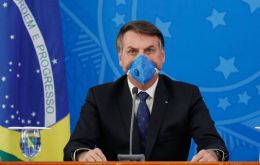MercoPress. South Atlantic News Agency
Tag: economy
-
Monday, April 13th 2020 - 10:30 UTC
EU agrees massive emergency Euros 500bn fund; Germany says “nein” to mutual guaranteed coronabonds

European Union finance ministers have agreed on a massive emergency package designed to ensure that member-states hit hard by the coronavirus pandemic will have the necessary resources to rebuild their economies.
-
Friday, April 10th 2020 - 15:45 UTC
IMF sees emerging markets and low income nations as the most exposed to the coming recession

The International Monetary Fund sees the world economy suffering its worst recession since the Great Depression this year, with emerging markets and low-income nations in Africa, Latin America and Asia at particularly high risk.
-
Thursday, April 9th 2020 - 14:57 UTC
Chilean consumer prices rose 0.3% in March, and 3.7% in twelve months

Chile consumer prices rose 0.3% in March, the government's statistics agency said on Wednesday, pushed upwards by a rise in food and education costs but counterbalanced by a fall in transportation prices.
-
Thursday, April 2nd 2020 - 08:50 UTC
One million Brits claimed “universal credit” welfare payments in two weeks

Almost one million people have claimed “universal credit” welfare payments in the UK in the past two weeks, exposing the massive economic hit from Boris Johnson's coronavirus lockdown.
-
Wednesday, April 1st 2020 - 07:45 UTC
Wall Street markets tumbled on Tuesday: Dow with its biggest quarterly decline since 1987

Wall Street’s three major indexes tumbled on Tuesday, with the Dow registering its biggest quarterly decline since 1987 and the S&P 500 suffering its deepest quarterly drop since the financial crisis on growing evidence of massive economic damage from the coronavirus pandemic.
-
Tuesday, March 31st 2020 - 09:20 UTC
Bolsonaro insists with his campaign to get the economy moving; Facebook censors the Brazilian president

Brazil's President Jair Bolsonaro said on Monday that there can be no more quarantine measures imposed on the country than those already in place to combat coronavirus because jobs are being destroyed and the poor are suffering disproportionately.
-
Tuesday, March 31st 2020 - 08:10 UTC
Surprising factory activity numbers in China, according to Beijing stats office

Factory activity in China unexpectedly expanded in March after contracting sharply to a record low, but the rapid global spread of the coronavirus is expected to keep businesses and the overall economy under heavy pressure as foreign demand slumps.
-
Monday, March 30th 2020 - 08:29 UTC
Bolsonaro urges followers in the streets to keep the Brazilian economy going

Brazil's president Jair Bolsonaro on Sunday flouted his government's social distancing guidelines against the spread of the coronavirus by mixing with supporters on the streets of Brasilia and urging them to keep the economy going.
-
Monday, March 30th 2020 - 07:22 UTC
Germany does not discard another huge financial package to prop the economy

Germany's 750 billion euro (US$834 billion) package to soften the economic impact of the coronavirus outbreak on Europe's largest economy will last for about two months, an independent economic think tank told a German newspaper group.
-
Saturday, March 28th 2020 - 08:26 UTC
Brazil's central bank preparing a “financial bazooka” to prevent recession becoming depression

Brazil’s central bank could soon be forced to fire up the money printing presses if the coronavirus-fueled recession facing Latin America’s largest economy is as devastating as some economists fear.
